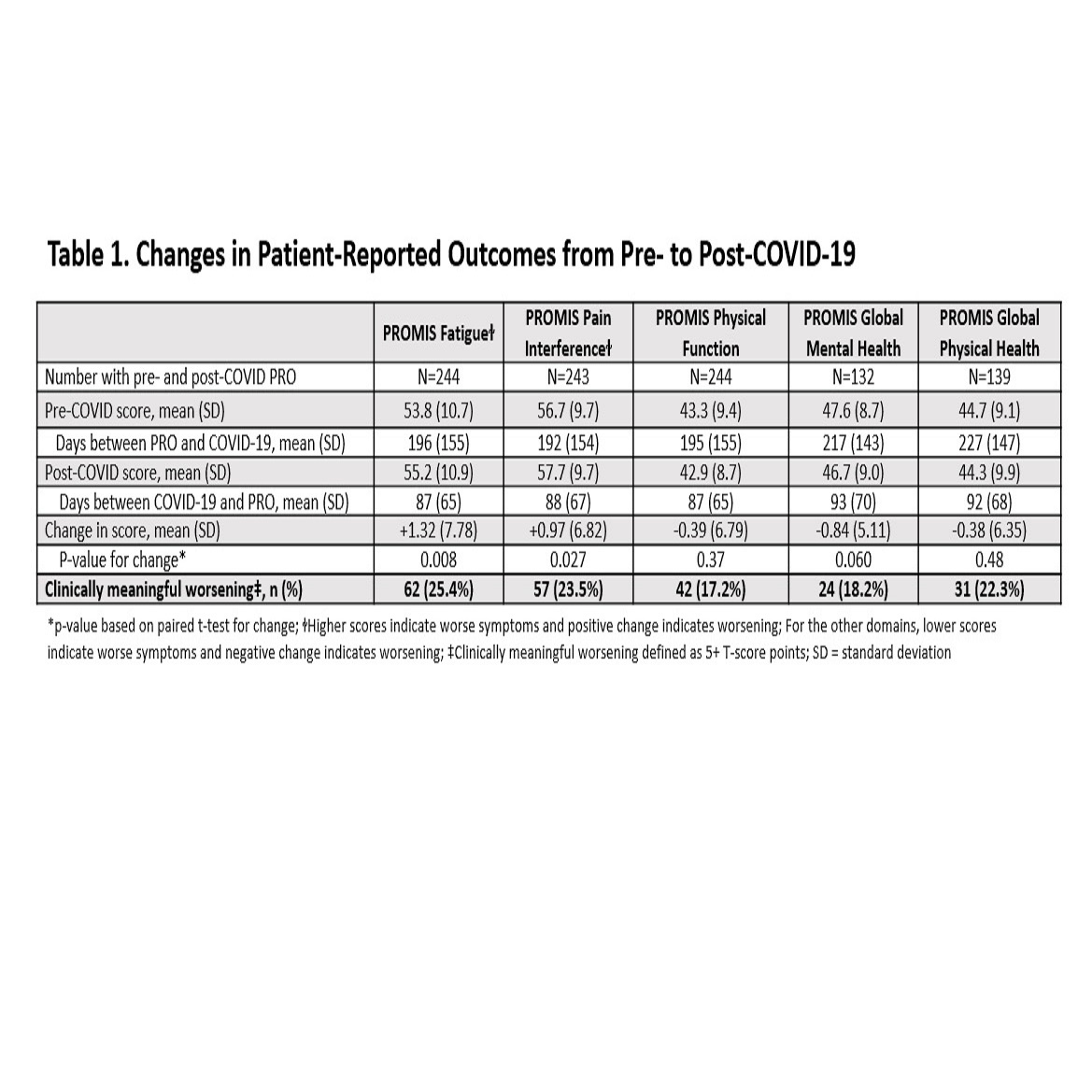Session Information
Session Type: Poster Session D
Session Time: 8:30AM-10:30AM
Background/Purpose: The persistence of symptoms following COVID 19 is an area of great interest yet remains poorly understood. Long COVID symptoms are dominated by fatigue (58%) and musculoskeletal pain (19%)1 and thus, of great interest, to know whether patients with rheumatic diseases will experience similar or worse outcomes than the general population. Prior analysis in the current COVID-19 literature lack pre-COVID infection data on these symptoms. This study provides a unique opportunity to examine the change in patient-reported outcomes (PROs) following COVID-19.
Methods: Rheumatic disease patients were evaluated for routine care and completed PROs in 2019 and following documented COVID-19 were included. Patients completed NIH’s Patient Reported Outcomes Measurement Information System (PROMIS) Fatigue, Physical Function, Pain Interference, Global Health (mental and physical function), and PHQ-2 or 9 depression scale. Data on potential predictors of worsening PROs were collected including severity of COVID-19 infection, index diagnosis, concomitant therapies and associated high risk comorbidities. Change in PROs was evaluated with paired t-test. Predictors of patients who meaningfully worsened on PROs (≥5 T-score points) following COVID-19 were identified through multivariable logistic regression models.
Results: There were 264 rheumatic disease patients (57yrs (+/-12.9), 203 female (77%)) seen in the outpatient department with 222 (84.1%) patients had a diagnosis of immune mediated disease by a board certified rheumatologist and 42 (15.9%) patients had a non immune mediated disease. Regarding COVID-19 outcomes, 43 (16.3% ) were hospitalized with 3(1.1%) requiring mechanical ventilation and 10 (3.8%) with pneumonia. Average length of stay was 6 (3,6) days and one patient died 1 (0.4%). PROs were completed a median of 6.5 months prior to COVID, and again median of 3 mo following COVID-19. Patient T-scores worsened on all PROs, but were only significantly worse on the domains of fatigue (mean±sd, 1.32±7.78) and pain interference (0.97±6.82). (Table 1) Meaningful worsening (≥5+ T-score) occurred for 25.4% of patients on PROMIS Fatigue, 23.5% on PROMIS Pain Interference, 17.2% on PROMS Physical Function, 18.2% on Global Mental Health, and 22.3% on Global Physical Health.
Eighty-seven patients completed the PHQ-2 or 9 prior to and following COVID-19. Eighteen patients (20.7%) had moderate/severe depressive symptoms and following COVID-19, depressive symptoms were indicated in only 10 (11.5%), p=.033. A reduction in Global Mental Health was experienced overall but was not significant. There were few predictors of worsening PROs and having better pre-COVID-19 PROs was the most predictive indicator of worsening.
Conclusion: Data from our rheumatology clinic where pre-infection PROs were available demonstrated a surprising modest effect of COVID including relevant domains of pain interference and fatigue compared to baseline. While further analysis is necessary including comparisons to non-rheumatic disease patients, these data suggest that in general patients with rheumatic disease make reasonable recovery following COVID-19 and may not have increased susceptibility to Long COVID-19 sequelae.
 1. Lopez-Leon S, Wegman-Ostrosky T, Perelman C, Sepulveda R, Rebolledo PA, Cuapio A, Villapol S. More than 50 Long-term effects of COVID_19: a systematic review and meta-analysis. medRxiv [Preprint]. 2021 Jan 30:2021.01.27.21250617. doi: 10.1101/2021.01.27.21250617. PMID: 33532785; PMCID: PMC7852236.
1. Lopez-Leon S, Wegman-Ostrosky T, Perelman C, Sepulveda R, Rebolledo PA, Cuapio A, Villapol S. More than 50 Long-term effects of COVID_19: a systematic review and meta-analysis. medRxiv [Preprint]. 2021 Jan 30:2021.01.27.21250617. doi: 10.1101/2021.01.27.21250617. PMID: 33532785; PMCID: PMC7852236.
To cite this abstract in AMA style:
Husni E, Calabrese C, Lapin B, Kirchner E, Calabrese L. Impact of COVID-19 Infection on Patient-Reported Outcomes in Rheumatic Disease Patients: A Cross Sectional Study [abstract]. Arthritis Rheumatol. 2021; 73 (suppl 9). https://acrabstracts.org/abstract/impact-of-covid-19-infection-on-patient-reported-outcomes-in-rheumatic-disease-patients-a-cross-sectional-study/. Accessed .« Back to ACR Convergence 2021
ACR Meeting Abstracts - https://acrabstracts.org/abstract/impact-of-covid-19-infection-on-patient-reported-outcomes-in-rheumatic-disease-patients-a-cross-sectional-study/
